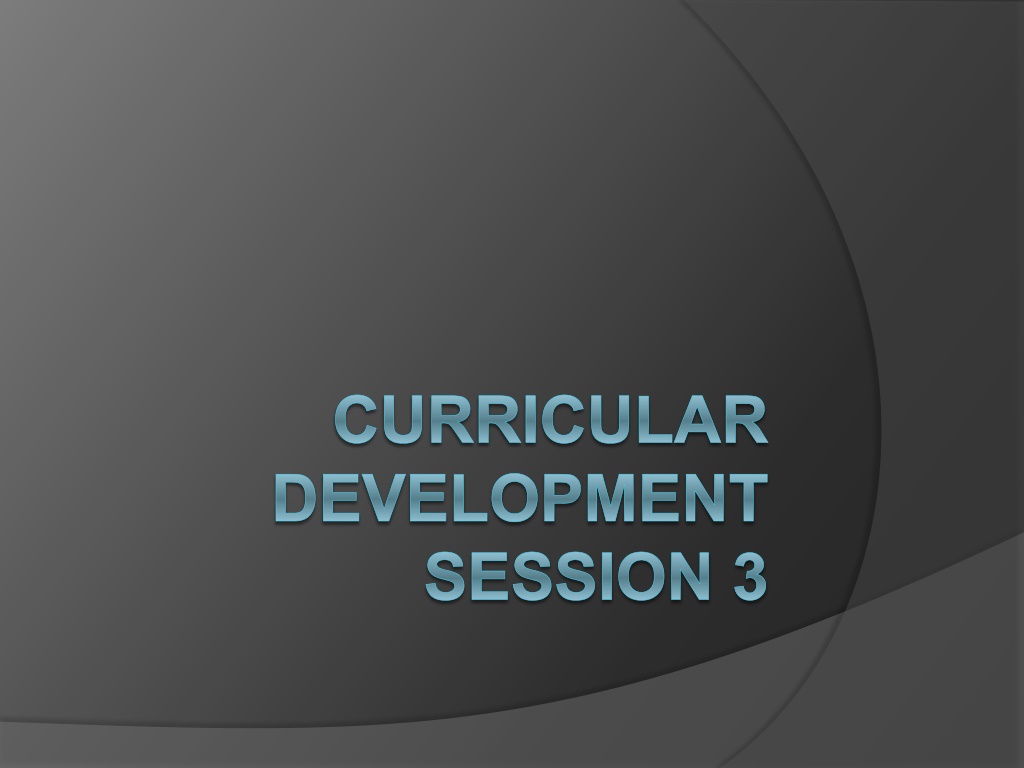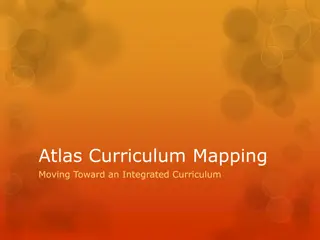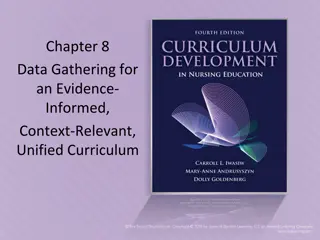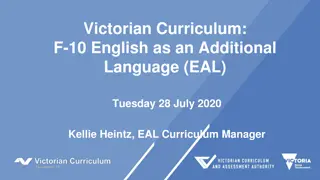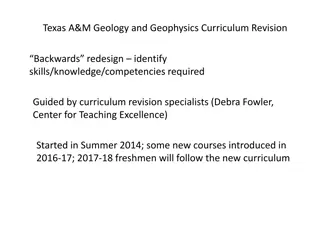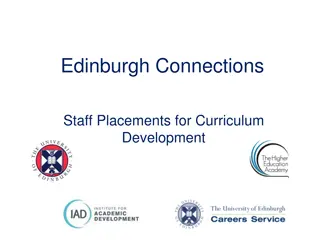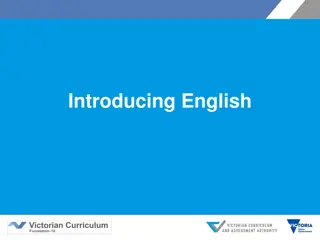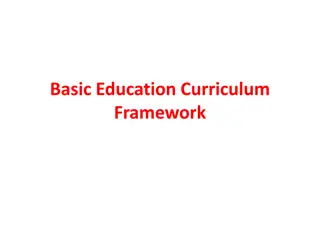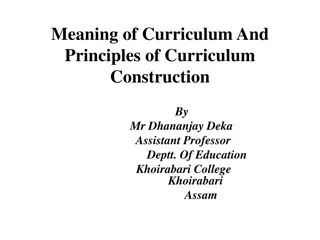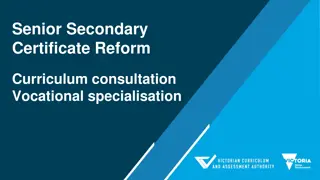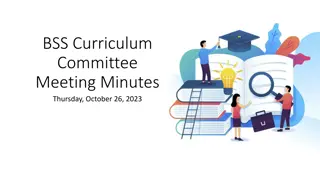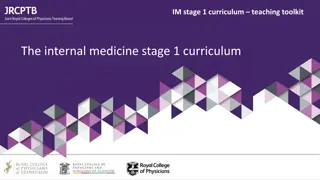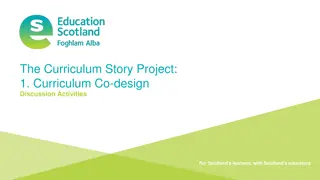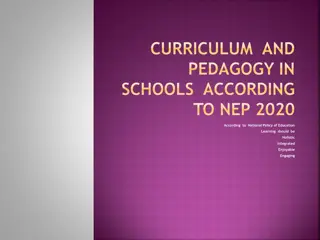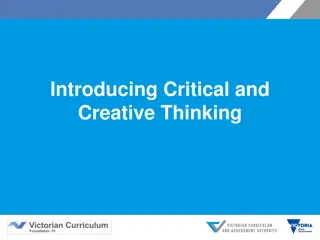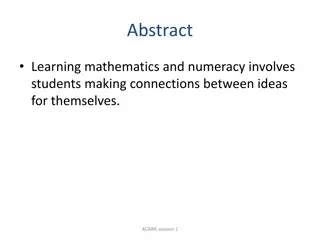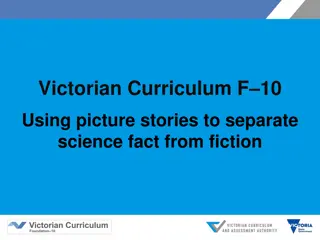Enhancing Curriculum Development for Effective Learning
In response to an Ofsted report, focusing on improving subject-specific vocabulary, fostering historian and geographer skills, and enhancing diversity and equality in the curriculum are deemed crucial. Practical steps such as defining key words, utilizing rich vocabulary resources, and inspiring curiosity in geography education are highlighted to achieve these goals.
- Curriculum development
- Subject-specific vocabulary
- Historian skills
- Geographer skills
- Diversity and equality
Uploaded on Nov 13, 2024 | 0 Views
Download Presentation

Please find below an Image/Link to download the presentation.
The content on the website is provided AS IS for your information and personal use only. It may not be sold, licensed, or shared on other websites without obtaining consent from the author. Download presentation by click this link. If you encounter any issues during the download, it is possible that the publisher has removed the file from their server.
E N D
Presentation Transcript
CURRICULAR DEVELOPMENT SESSION 3
Responding to Ofsted The Ofsted report was a realistic reflection of where we were in regard to the curriculum and they were very positive and could see where we were heading. In order for us to improve they highlighted 3 key points which we can now use to improve further
What did Ofsted say? The content for each subject is taught in a logical sequence. Teachers help pupils to remember what they have learned. For example, pupils in key stage 2 were able to summarise the causes and symptoms of the Black Death . They could also recall the main events in this period of history. Pupils, including those with SEND, are taught the skills they need to be successful learners. They draw on these skills to carry out their own research and stick at challenging tasks. However, written and discussion tasks are sometimes set because they support pupils learning in English rather than in other subjects. This means that pupils do not get enough practice in using subject-specific vocabulary in subjects other than English and mathematics. Pupils follow a broad and balanced curriculum. However, there is insufficient attention paid to subject-specific vocabulary in the foundation subjects. Leaders and teachers should ensure that more tasks require pupils to use subject-specific vocabulary with precision. In this way, not only will pupils learn geography or science, for example, but they will also learn to speak, think and write like a geographer or scientist. Leaders should ensure that there is a more explicit focus on diversity and equalities throughout the curriculum
The 3 areas we need to concentrate on 1. To develop subject specific vocabulary in the curriculum. 2. To develop an understanding of how to think, speak and learn like an historian or geographer. 3. To push the boundaries in regard to PSHE and develop a more explicit focus on diversity and equality.
Planning for your curriculum Step 1: Subject specific vocab Look at key words that are subject specific to history and geography for your topic. Ask pupils to find the definition of these words. Have them up on display and get pupils to refer to these in their work and when they are discussing the topics. Also pick class reading books which are rich in the vocabulary you want to introduce your pupils to.
How to be a Geographer A high quality geography education should inspire in pupils a curiosity and fascination about the world that will remain with them for the rest of their lives. What is geography? Geography is a subject packed with excitement and dynamism that brings together aspects of the world and helps us to better understand its people, places and environments, and the interactions between them. Geography also helps us understand how and why places are changing, and to better imagine, predict and work towards, likely and preferred futures. Underpinning all of this is a strong spatial component that deepens our understanding of what places are like, why and how they are connected, and the importance of location. Geography It is an enquiry led subject that seeks answers to fundamental questions such as: Where is this place? What is it like? (And why?) How and why is it changing? How does this place compare with other places? How and why are places connected? It is these fundamental questions that will be the stepping stones to us all improving our Geography curriculum.
Geography It is also imperative that a geographer doesn t just answer questions but also asks and debates them: What could/should the world be like in the future? What can we do to influence change? Geography draws on its vast range of vocabulary to identify and name places, the features within them and the human and physical processes at work there. Such core knowledge provides the building blocks of deeper explanation and understanding; providing entry points to geographical conversations about the world. Geography is more than just core knowledge. Places are dynamic and often space is perceived, used and contested by people in many different ways. Geography seeks to understand how different views, values and perspectives influence and affect places and environments at different scales. It helps explain why places are changing, how they are interconnected and why patterns of inequality exist at both local and global scales. Geography deals with the 'here and 'now' of real life and as such, is a vital 'living' subject that contributes to and enhances the wider curriculum. Although geography can be taught alone, it also offers meaningful contexts for high- quality cross - curricular work, as noted by Ofsted:
Planning activities The power of a well-chosen artefact Whether it is in creating the need to know, or in providing evidence for interrogation, what often sits at the very centre of a memorable geography lesson (or sequence of lessons) is a really great resource: a video clip, a photo, amazing facts and figures, a poem or song, a first- hand account, a page of fiction, a simple but iconic diagram... the list is endless. The difference between a curriculum resource (including the standard tools of the trade: atlases, globes, maps and textbooks) and curriculum artefact lies in the significance invested in the artefact by the curriculum maker, and the purpose and goal in using it.. The word artefact derives from the Latin phrase arte factum meaning to skilfully make . Making skilful use of resources allows artefacts to become the lynchpin of a lesson sequence. Its power is derived from how you use it, which is determined by your purposes your curriculum making. .
What could this look like? The man who fell to earth Here is a sample artefact on the theme of international migration. As an example of curriculum making it can be adapted and developed in various ways to suit particular purposes and contexts. This curriculum artefact is a video clip which provides a means to analyse the causes of international migration. It is a sad story that spans two continents and eight countries. In September 2012, a man in his twenties was found dead in a suburban street in west London. He had suffered horrendous injuries to his head and face, but had no identity papers on him - and no one had reported him missing. It soon became clear that the man must have fallen from a plane flying overhead on to the street below. The video clip shows who he was and how he arrived on a west London street. Using the curriculum artefact There are many ways that this artefact can be used. A discussion of how it can be used could provide a useful CPD activity. The creative act of using this artefact is part of curriculum making. Here are some suggestions: The video clip could be shown at the start of a lesson: Students have to write down all the geography that is mentioned in the clip or be provided with a summary of the clip and then highlight all the physical and human geography from the story. After watching the video students map the journey that Jose had taken from his home in Mozambique to west London. Annotate the map with push factors and pull factors. Show the very start of the video at the beginning of the lesson: Give students the enquiry question Why did Jose Matada end up on a west London street? Make mystery cards from the information from the video and other news articles then show the full video at the end of the lesson.
What these planning tools could look like? Although this is a sad story on Jose Matada the stimulus is amazing and really gets you into examining where that person came from so you are looking at map work, human and physical features as well as countries travelled through until final destination Why Britain - look at similarities and differences etc. It is a theme that we could use for our own curriculum with the use of video, artefacts that leads to a journey of exploration.
Planning Look at your curriculum and specifically choose a topic with a geography focus and then using a stimulus like the video or an artefact, plan a journey with the children being the geographers which incorporates all the key skills of finding out information in a fun and engaging way incorporating human and physical features of geography. Remember, you have already listed the skills and activities in your long term plans as laid out by the national Curriculum. You are just finding a way of teaching those skills in an exciting way over a series of lessons with a stimulus.
Task Please could you discuss in your year groups and send me an activity/ stimulus that you will be using with your Geography topic by Friday 19thJune
Session 4 The next session will be linked to PSHE.
